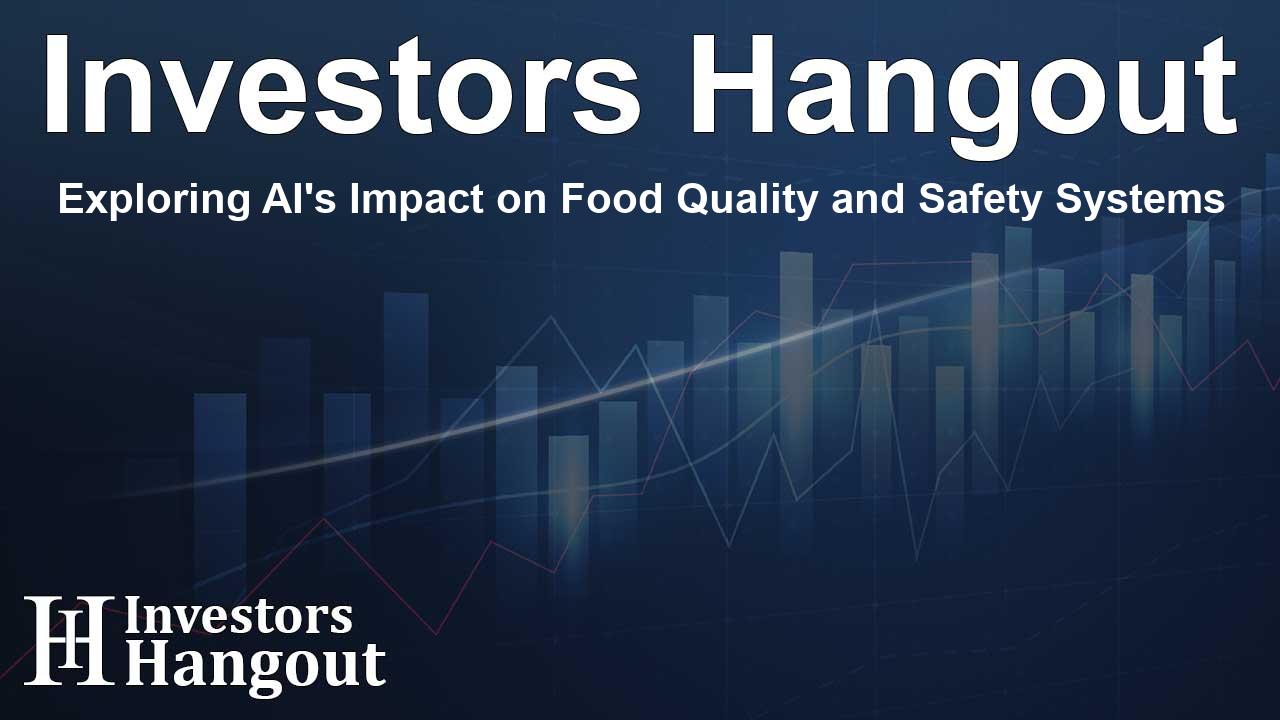Exploring AI's Impact on Food Quality and Safety Systems

AI's Transformative Role in Food Safety and Quality Control
The integration of artificial intelligence (AI) is significantly reshaping food safety and quality control, marking a crucial shift in how food industries operate. With an expected market growth of approximately $13.7 billion by the year 2030, there is a remarkable projected annual growth rate of 30.9% from 2025 to 2030. This surge can be attributed to the rising demand for predictive analytics, automated inspections, and comprehensive traceability throughout the food supply chain.
Driving Forces Behind AI Adoption
The necessity for advanced technologies in food safety is driven by several factors. For starters, the increased prevalence of foodborne illnesses caused by pathogens like Salmonella and E. coli heightens the focus on food safety. AI supports the early detection of contaminations by analyzing data from sensors and lab results, thus ensuring quicker responses and preventive measures.
Complex Supply Chain Issues
Today's food products often traverse a complex, multi-national network of suppliers, leading to greater risks of contamination and fraud. AI heightens traceability, allowing stakeholders to monitor each link in the supply chain, thereby identifying vulnerabilities and maintaining product integrity.
Consumer Expectations for Transparency
Modern consumers demand greater transparency regarding the origins of their food and the processes that bring it to their tables. AI systems help verify product sources, identify mislabeling issues, and ensure ethical sourcing practices, ultimately fostering consumer trust and ensuring compliance with regulations.
Innovative Applications of AI Technologies
Various AI technologies are being harnessed to improve food safety protocols. Technologies like machine learning, computer vision, and natural language processing are instrumental in applications ranging from contaminant detection to regulatory compliance. These innovations are particularly relevant in the realms of meat, dairy, and processed foods, where maintaining high safety standards is critical.
Predictive Analytics in Risk Management
By utilizing past and real-time data, AI can anticipate risks related to spoilage or equipment malfunction. Moreover, these technologies help automate quality checks, thereby ensuring consistency and reducing potential waste or recalls.
Personalized Food Safety and Nutrition
AI also facilitates personalized food recommendations tailored to individual health profiles, allergies, and dietary preferences. This not only promotes safer food consumption patterns but also helps manufacturers create customized products that reflect consumer health priorities.
Future Outlook and Strategic Recommendations
The report's insights present invaluable guidance for stakeholders navigating the changing landscape of food safety and quality control. The ongoing evolution, influenced by labor shortages, sustainability objectives, and a rising expectation for transparency from consumers, underscores the pressing need for real-time, automated monitoring systems.
No doubt, the future of food safety will be significantly driven by advancements in AI technologies, which will likely lead to innovative solutions such as autonomous food systems and the emergence of digital twins.
Frequently Asked Questions
1. What is the expected size of the AI in food safety market by 2030?
The AI market in food safety and quality control is projected to reach $13.7 billion by 2030, reflecting a robust annual growth rate of 30.9%.
2. What factors contribute to the growth of this market?
The growth is primarily driven by the rising incidence of foodborne illnesses, the complexity of supply chains, consumer demands for transparency, and innovations in predictive risk management.
3. Which segments are covered in the AI in food safety report?
The report provides a comprehensive analysis of sales data according to technology, application, deployment modes, and the end-use industries involved.
4. How is AI revolutionizing the food safety industry?
AI is automating critical processes such as real-time monitoring, risk prediction, and traceability, reshaping conventional practices towards more efficient solutions.
5. Who are the leading companies in the AI food safety market?
Some prominent market players include CLARIFRUIT, EGROBOTS CO., EUROFINS SCIENTIFIC, and KPM ANALYTICS, among others, each contributing unique innovations to enhance food safety.
About The Author
Contact Kelly Martin privately here. Or send an email with ATTN: Kelly Martin as the subject to contact@investorshangout.com.
About Investors Hangout
Investors Hangout is a leading online stock forum for financial discussion and learning, offering a wide range of free tools and resources. It draws in traders of all levels, who exchange market knowledge, investigate trading tactics, and keep an eye on industry developments in real time. Featuring financial articles, stock message boards, quotes, charts, company profiles, and live news updates. Through cooperative learning and a wealth of informational resources, it helps users from novices creating their first portfolios to experts honing their techniques. Join Investors Hangout today: https://investorshangout.com/
The content of this article is based on factual, publicly available information and does not represent legal, financial, or investment advice. Investors Hangout does not offer financial advice, and the author is not a licensed financial advisor. Consult a qualified advisor before making any financial or investment decisions based on this article. This article should not be considered advice to purchase, sell, or hold any securities or other investments. If any of the material provided here is inaccurate, please contact us for corrections.
